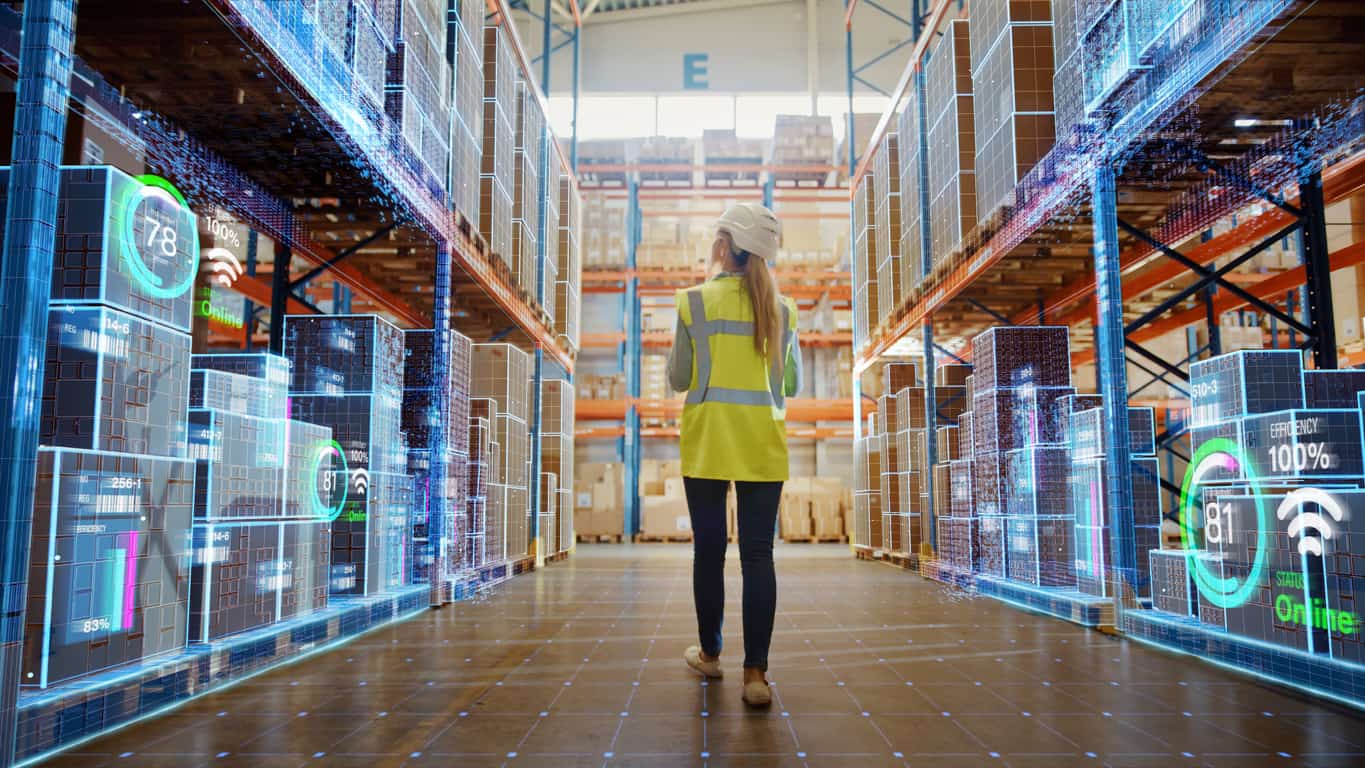Developments in AI technologies have created new opportunities, blazing a path for a seamless user experience and an optimised string of processes. The team at FWF use AI and emerging digital technologies to help businesses in the logistics industry to optimise their operations – in this article, we’ll share our knowledge on how and where AI can be best utilised within supply chains.
Get in touch to accelerate your logistics by integrating AI into your supply chain.
How can AI be used to improve supply chains?
Despite being a relatively new technology, AI is already a broad field with a huge number of applications and forms. For example, generative AI (GenAI) can create outputs based on its analysis of user behaviours and datasets, generating appropriate responses to user queries.
Within this field of potential, supply chains sit as one of the most opportune places to utilise the effectiveness of AI solutions. While supply chains have a series of typically procedures, the outputs like destination, time, and assets being handled can change drastically. This combination is perfect for AI, which can analyse the requirements needed to fulfil standard procedures to the highest quality – all at speeds faster than humans are capable of.
How does AI make logistics more efficient?
Integrating AI into your logistics integrations is the next step for the industry. You can expect major returns down the line, future-proofing your organisation and processes for new technologies as they arise. Implementing AI is nearly past the point of being an early adopter – it’s becoming the new industry standard.
Logistical AI is a way to increase potential profits while cutting on costs at each step of the supply chain. It comes with a myriad of benefits to your business – with AI, you can:
- Increase the speed of individual processes
- Handle issues and challenges without the need for human intervention
- Respond to customer concerns quickly and effectively
- Automate repetitive procedures
- Analyse data and find potential places for improvement
- Increase the accuracy of operations
- Predict when maintenance is required
- Allow for easier workforce management
Find out more about our digital & AI services for supply chains and logistics >
What are the applications of AI for logistics and supply chains?
The supply chain is made up of a huge number of processes, each with their own intricate features and potential challenges. AI technology can support and enhance logistics processes for the manufacturing of goods, their handling in storage and transit, and ultimately for last-mile delivery to customers.
Manufacturing
An Accenture study on the evolution of AI applications suggests that AI can be used to generate designs or blueprints for buildings, which can go on to be refined by human architects and designers. The components for these blueprints can then be processed in factories, piecing together the buildings “like LEGO sets”.
While that’s a potential future for AI in manufacturing, it also has benefits at the current time. AI co-bots are a new form of manufacturing robot, different to industrial robots, that can help streamline the production process of complex items like cars and computers.
By using AI-powered robots, the production line can be even further automated than ever before. As well as increasing efficiency, this can also ensure quality is maintained by training AI on testing procedures and acceptable limits.
While AI co-bots typically need a human operator, they can be automated even further by training a secondary AI to act as a supporting guardrail – almost entirely eliminating the need for human intervention in these mechanical, repetitive processes.
These new AI-driven manufacturing processes can then be integrated with AI in logistics and supply chains, creating a holistic automated journey with maximum efficiency and little room for error.
Discover how you can optimise your manufacturing processes by using AI >
Supply Chain Optimisation
AI optimises processes all across the supply chain. Fulfilment technology and robotics can benefit through AI co-bots and big picture processing. Meanwhile, warehouse and inventory management can be seamless automated with predictive algorithms that match and manage stock according to user demand.
Last-mile delivery analytics can lead to more accurate and cost-effective deliveries, and generative AI presents a step forward in personalisation and response rates for customers.
Major players in the industry are utilising AI to create entirely new ways of handling logistics and delivery, such as Amazon’s AI-powered delivery drones which can automatically bring parcels straight to the customer’s doorstep, without the need for a human controller.
In essence, the supply chain is being revolutionised through the use of AI, and the reach and effectiveness of these digital technologies will only continue to grow over time.
Research & Development
With access to enormous, tailorable datasets, AI is in the prime position for sifting through otherwise unmanageable amounts of information. This can support human researchers, helping them to quickly narrow down data into what they actually need.
On the development side, AI can help to identify trends and produce statistics based on processed data. A quicker analysis of results means a smoother process into actioning them, potentially speeding up your R&D efforts by a large margin.
Accelerating the production process through AI’s innate ability for pattern recognition, predictions, and processing allows for rapid resolutions to complex problems. For logistics and supply chains, this means finding the best ways to handle each stage of a multi-factored fulfilment journey in the shortest time possible, as well as producing new tools and tech to enhance the process.
Quality Control & Assurance
By processing data at extreme rates, AI is able to provide assurance for the quality of your services in an incredibly short time.
Quality control for logistics and supply chains means ensuring proper handling of assets, navigating regulations, and meeting deadlines for delivery. Intelligent automation achieves this at unprecedented levels without the need for constant human supervision, allowing a hands-off assurance for your operational efficacy.
Achieve your goals for quality and customer experiences with our process excellence solutions >

Five challenges and solutions for AI in supply chains
To help you get the most out of AI technologies, we’ve outlined the top five concerns that businesses have which make them hesitant to adapt to the times – as well as the solutions that can help you mitigate these challenges.
1. Costs
The challenge: The initial cost for investing in AI can be quite high, and replacing infrastructure can be costly in both time and financial terms.
The solution: Democratised AI represents an opportunity for businesses to easily take advantage of the benefits of AI. Plus, replacing infrastructure early means futureproofing your business for advancements down the line – saving you costs in the long run.
2. Complexity
The challenge: AI can require specialised hardware, and are often cloud-based which needs specific infrastructure and access to enough bandwidth to operate.
The solution: Advancements to internet technologies mean that high quality bandwidth is only getting cheaper. Additionally, low code platforms and accessible AI are giving businesses access to resources that would require significant technical skill and investments otherwise.
3. Training
The challenge: Making sure personnel are able to interact with AI systems and manage them when required will mean they need to be trained. This presents a potentially expensive and time-consuming process, or could mean you need specialists in to manage the programs.
The solution: Adapting to advancements means embracing new technology as it comes. The returns outweigh the investments, and with accessible AI and low code solutions that don’t require prior knowledge of programming, the route towards adopting AI is more streamlined than ever.
4. Scalability
The challenge: Different AI systems might have different technical requirements, so finding ones that integrate with each other as well as your logistics infrastructure could be challenging for some niches.
The solution: AI and cloud-based systems are inherently scalable, and the initial investment for integrating these systems is often quite low, meaning that scalability isn’t a problem for AI – rather, it is one of the core benefits that it offers.
5. Regulations
Arguably having an impartial, unbiased AI handling sensitive data is better than a human operator. The problem then is making sure the AI is actually unbiased, as some AI have known to handle user data in an inappropriate way.
The other concern with the handling of user data through AI is that they’re invariably cloud based. This means that the data is being streamed online, so ensuring the security and proper disposal/storage of data in accordance with GDPR is a must.
The solution to regulatory problems is training and control. There needs to be oversight and intervention of outside bodies such as secondary AI or human operators to ensure that the output and processes of AI remain unbiased, secure, and compliant.
Enhance your logistics with intelligent automation from FWF
The future of supply chains is one where repetitive processes are optimised through intelligent automation born from AI integration. Logistics is one of the best industries to adopt these digital technologies, benefitting from AI across the extensive range of regular processes.
At FWF, we help logistics businesses to adopt AI and other digital tech into the supply chain, providing training and information to ensure a seamless integration into your operations. Build the workforce of the future today – get in touch, check out our services, or read on for more information.
Accelerate your retail and inventory management by leveraging low code platforms >




